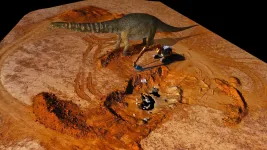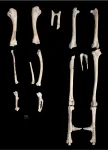Climate warming to increase carbon loss in Canadian peatland by 103 per cent
2021-06-07
(Press-News.org) Carbon loss in Canadian peatland is projected to increase by 103 per cent under a high emission scenario, according to new research led by scientists from the University of Waterloo.
The results of the study, which was published today in Nature's Communications Earth & Environment journal, reinforces the urgent need for a comprehensive understanding of peatlands as evolving sources of atmospheric CO2 in a warming world.
Peatlands, which are a type of wetland, are some of the most valuable ecosystems globally. In addition to their role in preserving biodiversity and minimizing flood risk, they store approximately one-third of the world's terrestrial organic carbon, despite only covering an estimated three per cent of the continents.
The researchers believe the study, which had Faculty of Engineering student Arash Rafat as lead author, has implications for future climate policy. Even under the lowest radiative forcing scenario, peatlands will act as a source of CO2 during the non-growing season (NGS) throughout the remainder of the 21st century. This reinforces the hypothesis that climate warming has the potential to increase peatland CO2 emissions during the NGS across various northern regions from around the world.
"Our research offers important insights into how Canada's northern peatlands will react to climate warming, especially during the non-growing season," said Fereidoun Rezanezhad, a professor in Waterloo's Department of Earth and Environmental Sciences. "As the climate warms, it is important to understand to what degree this will impact peatland ecosystems and their release of CO2 emissions - especially in areas of greatest warming, which include peatlands in northern regions and during the NGS."
To improve our ability to predict NGS CO2 emissions from northern peatlands under current and future climate change, a team of Waterloo's Water Institute researchers led by Ecohydrology Research Group professors Rezanezhad and Philippe Van Cappellen worked with professor William Quinton of Wilfrid Laurier University, professor Elyn Humphreys of Carleton University, and research scientist Dr. Kara Webster from the Canadian Forest Service Great Lakes Forestry Centre.
The team developed a machine-learning model to determine that changes in soil temperature and photosynthesis are the primary drivers of changes in net carbon flux. To predict future NGS CO2 emissions, the team developed the model using a continuous 13-year dataset of eddy covariance flux measurements from a peatland site located in Ottawa, Canada called the Mer Bleue Bog.
"The projected 103 per cent increase in peatland carbon loss by 2100 under a high radiative forcing scenario will constitute a strong positive climate feedback loop," said Rafat, who engaged in the research during his co-op term in the Waterloo's Faculty of Science. "In this climate feedback loop as the climate warms, peatlands release greenhouse gases, which in turn contributes to further climate warming."
INFORMATION:
ELSE PRESS RELEASES FROM THIS DATE:
2021-06-07
Older Chinese immigrants who adjust to their new cultural environment by learning the language, following the country's media and socializing with local residents can reduce acculturation gap with their adult children and protect their cognitive function, according to a Rutgers study.
The study, published in the journal Aging and Mental Health, is one of the first to explore the relationship between intergenerational families, acculturation and cognitive function among older Chinese Americans.
Researchers looked 2,900 Chinese Americans over age 60 who had at least one child and who participated in the PINE Study, an epidemiological study of older Chinese Americans. They analyzed three areas of acculturation - language, media use and ethnic social relations - and how they corresponded ...
2021-06-07
What's as long a basketball court, taller than a b-double and has just stomped into the record books as Australia's largest dinosaur? It's time to meet Australotitan cooperensis - a new species of giant sauropod dinosaur from Eromanga, southwest Queensland.
Australotitan, "the southern titan", has been scientifically described and named by Queensland Museum and Eromanga Natural History Museum palaeontologists.
It is estimated to have reached a height of 5-6.5 metres at the hip and 25- 30 metres in length and sits within the top 10-15 largest dinosaurs world-wide, representing Australia's entry into the largest species to have ever walked the Earth.
The fossilised skeleton was originally nicknamed 'Cooper' after Cooper Creek, ...
2021-06-07
An international team of scientists led from the Centre for Astrobiology (CAB, CSIC-INTA), with participation from the Instituto de Astrofísica de Canarias (IAC), has used the Gran Telescopio Canarias (GTC) to study a representative sample of galaxies, both disc and spheroidal, in a deep sky zone in the constellation of the Great Bear to characterize the properties of the stellar populations of galactic bulges. The researchers have been able to determine the mode of formation and development of these galactic structures. The results of this study were recently published in The Astrophysical Journal.
The researchers focused their study on massive disc and spheroidal galaxies, using imaging data from ...
2021-06-07
Bad sleep causes severe health issues and affects our ability to concentrate, memorize, and cope with challenging situations. Individuals with neurodevelopmental disorders such as autism and intellectual disability, frequently suffer from sleep problems. However, little is known about their underlying mechanisms. In Science Advances, a Dutch-American research team, coordinated by Radboudumc, now describes how these problems can arise. Mimicking two genetic causes of autism in fruit flies, they uncovered that flies show the same sleep problems as the patients, and that the disturbed ...
2021-06-07
Ancient chickens lived significantly longer than their modern equivalents because they were seen as sacred - not food - archaeologists have found.
Experts have developed the first reliable method of finding the age of fowl who lived thousands of years ago. Their research shows they lived to advanced ages, and were kept for ritual sacrifice or cockfighting rather than meat or egg production.
Chickens today live for a few weeks (in the UK poultry birds live for between 33 and 81 days), but during the Iron Age, Roman and Saxon period they lived up to the age of two, three or even four years old.
Calculating ...
2021-06-07
On Friday, 11 June, Europe's men's football teams will start the European Championship a year later than planned. The favourite this time is France with a probability of winning of 14.8 per cent. This is what an international team of researchers consisting of Andreas Groll and Franziska Popp (both TU Dortmund, Germany), Gunther Schauberger (TU Munich, Germany), Christophe Ley and Hans Van Eetvelde (both Ghent University, Belgium), Achim Zeileis (University of Innsbruck, Austria) and Lars Hvattum (Molde University College, Norway) has shown with the help of machine learning. Their forecast combines several statistical models for ...
2021-06-07
For years, psychology researchers have treated peer rejection and social network isolation as being somewhat interchangeable when it comes to early adolescence; it was thought that if kids fell into one of those two groups, they fell into the other. A recent study finds there is actually little overlap between the groups - and socially isolated kids face different risks.
"Broadly speaking, there are two types of socially marginalized groups in early adolescence," says Kate Norwalk, lead author of the study and an assistant professor of psychology at North Carolina State University. "There are kids who face peer rejection, meaning they are disliked by other kids; and there are kids who are experiencing social network isolation, meaning they don't have a ...
2021-06-07
Many contemporary political conflicts are between those who would prioritize the needs of local or national communities and those with a more universal outlook. According to a new study by IASS researcher Silvia Weko, this split between "communitarian" and "cosmopolitan" Europeans is also evident in their attitudes towards European climate policy. Achieving climate neutrality without exacerbating societal divisions within and between countries will require the EU to strike a careful balance.
In political philosophy cosmopolitans and communitarians are frequently characterized as "winners" and "losers" of globalization. ...
2021-06-07
UPTON, NY--What happens when very short pulses of laser light strike a magnetic material? A large international collaboration led by the U.S. Department of Energy's (DOE) Brookhaven National Laboratory set out to answer this very question. As they just reported in the Proceedings of the National Academy of Sciences, the laser suppressed magnetic order across the entire material for several picoseconds, or trillionths of a second. Understanding how magnetic correlations change on ultrafast timescales is the first step in being able to control magnetism in application-oriented ways. For example, with such control, we may be able to more quickly write data to memory devices or enhance superconductivity ...
2021-06-07
The lack of data is a major bottleneck for many kinds of research, and especially for the development of better medical treatments and drugs. This data is extremely sensitive and, understandably, people and companies alike are often unwilling to share their information with others.
Researchers at the Finnish Center for Artificial Intelligence have developed a machine learning-based method that produces synthetic data on the basis of original data sets, making it possible for researchers to share their data with one other. This could solve the ongoing problem of data scarcity in medical research and other fields where information is sensitive.
The generated data preserves privacy, remaining similar enough to the original data to be used for statistical ...
LAST 30 PRESS RELEASES:
[Press-News.org] Climate warming to increase carbon loss in Canadian peatland by 103 per cent



